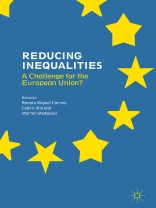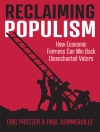This edited collection analyses social inequality in the European Union, within and between countries. The work critically explores both vertical inequality, existing between those with high incomes and low incomes, and horizontal inequality, existing between groups according to nationality, age, ethnicity, and gender.
Reducing Inequalities has been written by leading academics in the field who describe the current social situation in the European Union, focussing on inequality from a multidimensional perspective that includes income, poverty, social exclusion, education. The authors argue that social issues such as these have become national prerogatives for countries within the European Union. In response they ask: How does the European Union engage with inequality today? What principles of social solidarity ought to be applied between states and citizens of the European Union? What should be the role of European Union and its institutions regarding the challengeof reducing inequality?
This book will be of interest to anyone seeking to understand inequality as a multidimensional concept, rather than solely as an economic phenomenon, across different geographical and historical contexts.
Innehållsförteckning
1. Introduction .- Section 1: Inequality and Poverty in European Union .- 2. Disposable Income Inequality, Cohesion and Crisis in Europe.- 3. Drivers of Growing Income Inequalities in OECD and European Countries.- 4. Unemployment, Precariousness and Poverty as Drivers of Social Inequality: The Case of the Southern European Countries.- 5. Distributional and Categorical Inequalities in Europe: Structural Configurations.- 6. Income Poverty in the EU: What Do We Actually Measure? Empirical Evidence on Choices, Underlying Assumptions and Implications (Based on EU-SILC 2005-2014).- 7. Poverty and Social Exclusion Indicators in the European Union: The Role of Non-Monetary Deprivation Indicators.- 8. Inequality of Outcomes and Opportunities Among the Young.- Section 2: European Union Against Inequality .- 9. The European Union Social Tools in Question.- 10. European Union Policy on Gender Equality: The Scope and Limits of Equality in the Single Market.- 11. European Union and Human Rights: Reducing Inequalities and Asymmetries in the Context of the Economic Crisis.- 12. Normative Arguments for a European Social Union.- 13. Hayek’s Trap and the European Utopia We Need.- 14. Wealth, Taxation and Inequality.- 15. Conclusion: Back to the Future: Towards a European Social Agenda.
Om författaren
Renato Miguel Carmo is a Research Fellow at the Centre for Research and Studies in Sociology (CIES-IUL) and Assistant Professor at the University Institute of Lisbon (ISCTE-IUL), Portugal. He is Director of the Observatory of Inequalities and member of the European research network, Inequality Watch. Issues such as social and spatial inequalities, public policy, mobilities and social capital have been at the core of his research projects.
Cédric Rio is a philosopher specialised in social justice and inequality and he is currently a researcher at the Centre Maurice Halbwachs (CNRS/EHESS/ENS) in France. He is the coordinator of Inequality Watch, an independent European research network.
Márton Medgyesi is Senior Researcher at both the TARKI Social Research Institute, Hungary and at the Institute for Sociology, Centre for Social Sciences at the Hungarian Academy of Sciences. He holds an MSc in Applied Economics from Sciences Po, France and a Ph D in Sociology from Corvinus University of Budapest, Hungary.












